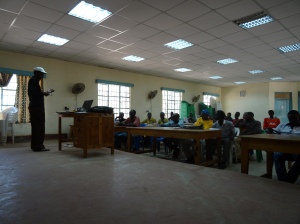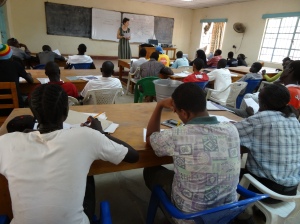At least 33 youths including volunteer staff of KANERE News turned up for a journalism workshop at Arrupe Learning Center.
“What does ‘free press’ mean?” was the final and perhaps most important question discussed in the Journalism Workshop. The workshop was offered at Arrupe Learning Center in partnership with Kakuma News Reflector (KANERE) on Saturday, March 1, 2014. Thirty three people gathered for a two-hour session that sought to give participants a better understanding of news reporting and equip them with the tools to begin writing their own stories.

After a quick round of introductions, the workshop began with the basic definition that news is unusual. As Qaabata Boru, the Founder and Editor of KANERE, explained to participants, a story about a dog biting a man is hardly newsworthy but when a man bites a dog – now that is unusual!
The participants were reminded of the leading questions that drive any story, also known as the 5 W’s + H = Who, What, When, Where, Why and How. After reviewing the structure of an article, Joyce Keeley, a Course Facilitator at Arrupe, offered a few suggestions for conducting interviews and gathering information.
The workshop closed with a summary of the qualities of a news story and a discussion about the importance of journalism. Lively debate and interactive dialogues arose during the sessions from multinational participants who are impatient to study and develop skills of storytelling.
Participants watched a segment from Citizen News on life in Kakuma Refugee Camp and were asked to think critically about whether it accurately depicted their personal experience. As emerging news contributors, they were urged to recognize the power media has in influencing public opinion.

Arrupe Center and KANERE hope this will be the first of many workshops that invites the community to engage in interactive discussions and critical thinking. The participants asked many probing questions and demonstrated a passion to learn that reaches beyond a mere desire for certificates and sodas – neither of which were offered anyway! However, the participants were provided with the printed version of the most recent Kanere publications and workshop handouts.
In Kakuma refugee camp, there’s been a great need for outreach programs to help refugees develop their storytelling powers, since this is not encouraged by the humanitarian organization, thus KANERE fills this gap. The newspaper will aim to provide more media training opportunities to empower refugee youths to be potential storytellers and news gathers.
At the close of the workshop, all participants were encouraged to get involved with the various news sources in the camp and invited especially to contribute stories to KANERE.
“As you know, there is no advocacy as effective as that associated with the human face and actual voice of real refugees.” – Lavinia Limon, USCRI, USA.
